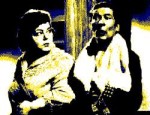Film Review

As the film shows, colonial attitudes still prevail long after the old European empires have fallen by the wayside. The ready-to-please black man is all too willing to prostrate himself before the wealthy white man (or woman) - not because the white man is holding a gun or a whip but because he has a handful of desperately needed dollar bills. At least this is the surface impression. In reality, both sides in this apparent master-servant relationship are aware that what they are playing out is a charade. It's a game of mutual exploitation, a sick parody of colonial subjugation, in which blacks pretend to kowtow to their white overlords, whilst the latter shut their eyes to anything which may offend their lily white sensibilities. So much for racial equality.
Whilst Cantet manages to get across these ideas very effectively, he is less successful with the real substance of the film, which is three slightly over-the-hill women looking for paradise and ending up in a guilt-ridden Hell. The device of the three self-pitying women - none of whom is particularly convincing, despite credible performances from the three lead actors - appears clumsy and indeed mildly offensive given the seriousness of the subject matter. Meanwhile, the other half of the story, involving the far more interesting and believable character Legba, is sorely underdeveloped and merely emphasises the feeling of superficiality, of an opportunity for a great piece of cinema dashed by a mediocre, overly self-conscious screenplay.
It may not be as substantial and satisfying as Cantet's previous two films, but Vers le sud is nonetheless a thought-provoking and engaging work which broaches some worthy issues with some degree of intelligence and sensitivity. One thing the film does convey is the dual nature of the Caribbean setting - a tropical paradise to Western tourists who come in search of escape from the grind of daily life, a living Hell for the locals who end up being caught in a barbed net of crime, violence, poverty and premature death. The irony is that it is the money from the sybarite visitors which fuels, not dampens, this particular inferno of suffering. Ellen's inability to save her young black lover in the film is an effective metaphor for the seeming futility of the West's well-meaning but largely half-hearted attempts to bring harmony and security to the rest of the world. How can good intentions and a guilty conscience ever succeed where colonial might and armed oppression have so badly failed?
© James Travers 2008
The above content is owned by frenchfilms.org and must not be copied.
Film Synopsis
Three women, each in her fifties, meet whilst holidaying on the beaches of Haiti in the late 1970s. They are there for one reason - to have a good time. Ellen, a university professor, is well into a torrid relationship with an attractive 18-year old Haitian, Legba, something which provokes a certain amount of jealousy in her companions Sue and Brenda. The illusion of an island paradise is transitory, however. The three women are about to glimpse the darker side of this tropical Eden..© James Travers
The above content is owned by frenchfilms.org and must not be copied.
Similar Films
Here are some other films you may enjoy watching:- La Belle personne (2008)
- La Fabrique des sentiments (2008)
- Les Regrets (2009)
- Les Temps qui changent (2004)
- 5x2 (2004)
Other related links:
Film Credits
- Director: Laurent Cantet
- Script: Laurent Cantet, Robin Campillo, Dany Laferrière (book), Sandy Whitelaw (dialogue)
- Cinematographer: Pierre Milon
- Cast: Charlotte Rampling (Ellen), Karen Young (Brenda), Louise Portal (Sue), Ménothy Cesar (Legba), Lys Ambroise (Albert), Jackenson Pierre Olmo Diaz (Eddy), Wilfried Paul (Neptune), Anotte Saint Ford (Limousine Girl), Marie-Laurence Hérard (Airport Woman), Michelet Cassis (Charlie), Pierre-Jean Robert (Chico), Jean Delinze Salomon (Jérémy), Kettline Amy (Denise), Daphné Destin (Lossita), Guiteau Nestant (Frank), Violette Vincent (Legba's Mother), Ti Koka (Orchestra Member), Wanga Negès (Orchestra Member), Anathole Bonhomme (Policeman), Michelet Ulysse (Bob)
- Country: France / Canada
- Language: French / English
- Support: Color
- Runtime: 108 min
- Aka: Heading South
The best of American film noir

The Carry On films, from the heyday of British film comedy

The best of Russian cinema
